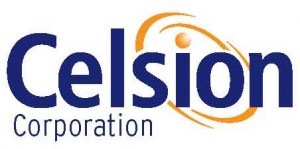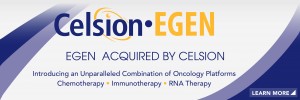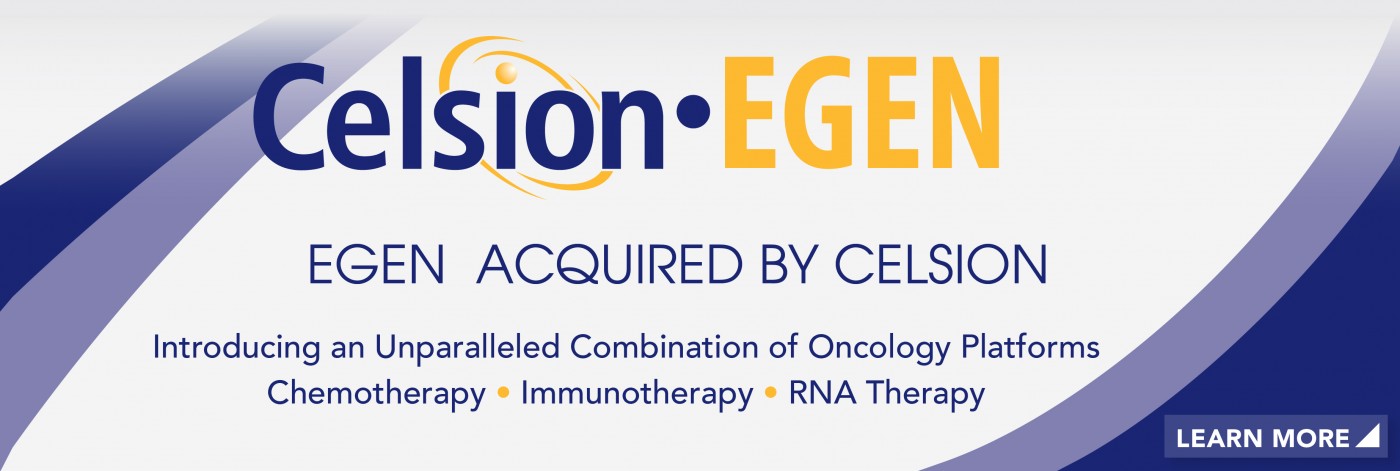 Celsion Corp., a biopharmaceutical company developing mid-to-later stage therapies for cancer, recently acquired EGEN, Inc., a drug developer with a proven track record for designing innovative cancer treatments in the pharmaceutical industry. The acquisition will place the newly-combined companies at the forefront of cancer immunotherapy research and development.
Celsion Corp., a biopharmaceutical company developing mid-to-later stage therapies for cancer, recently acquired EGEN, Inc., a drug developer with a proven track record for designing innovative cancer treatments in the pharmaceutical industry. The acquisition will place the newly-combined companies at the forefront of cancer immunotherapy research and development.
Celsion currently has a broad pipeline of research, from preclinical studies to Phase III trials, all launched from a single platform, the ThermoDox, a therapy consisting of intravenously delivered doxorubicin enhanced with lysolipid thermally sensitive liposomes that upon heating change structure, creating openings in the liposomes to release doxorubicin directly into the targeted tumor.
EGEN brings to Celsion a therapeutic product candidate already in clinical trials, alongside three new technology platforms focused on immunotherapy and cancer treatments that exploit nucleic acid-based cellular components of DNA and RNA. EGEN’s lead immunotherapy, EGEN-001, is an IL-12 plasmid vector formulated with the company’s proprietary DNA delivery system, TheraPlas™, forming highly active nanoparticles that can be targeted directly into the tumor microenvironment, inducing remission.
EGEN-001 has already been evaluated in Phase I and Phase II clinical trials as a monotherapy for treating recurrent ovarian cancer, one of the most common late-stage diseases among women due to difficult early detection, and is currently being tested in a Phase I clinical trial in combination with liposomal doxorubicin, hopefully resulting in safety profiles that can support a more effective study in first-line patients receiving combined treatment with docetaxol, another anti-cancer agent, and platinum, as a neo-adjuvant. Furthermore, using TheraPlas™, EGEN has already experimented combining EGEN-001 with doxorubicin.
Celsion believes that its EGEN-001 IL12 immunotherapy has the potential to treat patients who have not undergone successive rounds of chemotherapy, since a healthy immune system is essential to stimulate an immune response to stop tumor growth in a way complementary to the adjuvant agents, enhancing the overall efficacy. Thus far, the results have been promising, with only transient stomachache, mild fever, and chills typical of a cytokine response as adverse side effects. Moreover, use of a DNA plasmid did not lower efficacy of the chemotherapy agents nor add to side effects, holding EGEN-001 as a likely candidate for maintenance treatment in ovarian cancer when other options fail, and eventually, as a front-line treatment.
 The newly-merged company also plans to test EGEN-001 in glioblastoma multiforme, one of the deadliest kinds of brain cancer, possibly in combination with a standard-of-care chemotherapy drug.
The newly-merged company also plans to test EGEN-001 in glioblastoma multiforme, one of the deadliest kinds of brain cancer, possibly in combination with a standard-of-care chemotherapy drug.
One of the other platforms EGEN has developed includes TheraSilence™, a system for the delivery of RNA interference (RNAi), which regulates protein production and silences possible cancer mutations. Using this approach, a drug candidate has emerged so far, EGEN-RNA-002, now in preclinical development.
RAST (RNA Amplification and Secretion Technology) is the third platform emerging from EGEN’s line of research, allowing cells to make and produce RNA, offering potential drug design for intracellular therapies.
Back in 2013, Celsion had a regulatory problem when its most advanced clinical trial, the HEAT study (in Phase III) for primary hepatic cell carcinoma (HCC), did not meet its primary endpoint of a 33% improvement in progression-free survival. However, subsequent data showed treatment times were too short, revealing that ThermoDox, when coupled with radio-frequency ablation for more than 45 minutes, resulted in 55% improvement in overall survival two years after the treatment.
Because these therapies are specifically targeted to attack cancer cells while limiting damage to normal cells, the drug technologies, research and development of both companies are likely to create a strong synergy.


